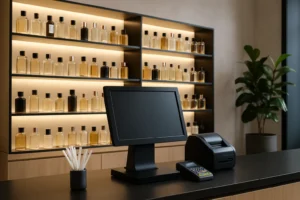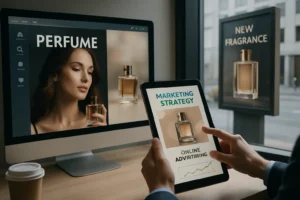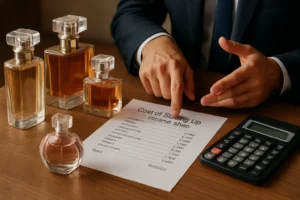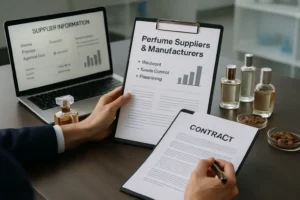Are you looking for a small business venture that genuinely “makes money” without the hype? Imagine a customer walking into your store, sampling two scents organized by occasion, making a choice in under a minute, while simultaneously, a WhatsApp message notifies you of a ready order from your digital catalog. No excessive décor, no confusing product range, just a smart experience that drives the purchase decision. This is where you separate a shop people simply pass by from a shop where scents sell themselves.
In this comprehensive guide, you will find exactly what you need without the fluff: why a perfume store business succeeds, step-by-step instructions for setting up a perfume shop from scratch, the equipment worth buying, a lightweight marketing approach focusing on WhatsApp and short-form content, a method for estimating costs using flexible percentages instead of rigid figures, concise expert advice from the Jasmine team, and how to rationally select a wholesale supplier and manufacturer—all concluded with a quick FAQ section to resolve your most critical questions before launch.
Why Perfume is an Ideal Business Venture?
Perfumery products are an evergreen commodity: they are purchased for daily use, gifted for special occasions, and repurchased as moods and seasons change. This is why many entrepreneurs succeed when setting up a small perfume shop built on an organized, sensory experience and clear pricing.
Crucially, the broader market supports this trend: the global fragrance market was valued at around $56.6 billion in 2024, with an anticipated Compound Annual Growth Rate (CAGR) of approximately 4.9% through 2030. This signifies a vast, stable demand base you can build upon locally. Specifically in our region, the Middle East fragrance market shows above-average momentum; independent estimates place it at $3.76 billion in 2024 with an expected annual growth of 7.5% over the next decade—a tangible indicator of opportunity for specialized stores in our cities.
Project success doesn’t rely solely on taste; digital channels have fueled category growth and facilitated quick launches. Recent industry reports show that online beauty sales grew nine times faster than in-store sales last year, while other analyses anticipate the beauty sector as a whole will grow by about 5% annually through 2030. Operationally, this means your venture can effectively combine a small physical storefront with instant orders via WhatsApp or an e-commerce platform without inflating costs.
If you desire a calculated launch, Jasmine plays a direct role: we are a perfume and home fragrance manufacturer offering Private Label options for your brand, flexible filling for desired sizes, and ready-to-use photos/descriptions for both the shelf and your e-commerce platform. Everything you need to start selling quickly and confidently. Take an actionable step now: request a sample pack of launch scents suitable for your city via WhatsApp, or learn about our manufacturing and filling solutions on our website.
Also read: Perfume Business: Is selling Perfume Profitable?

How to set up a perfume Shop?
1) Define Segment and Location
Start by identifying who you are selling to (gifting, daily use, lovers of Oriental/Global scents). Choose a location where your audience passes by: near beauty salons, gift shops, commercial centers, or a busy street. Note the foot traffic at different times before signing the lease.
2) Finalize Brand Name and Licensing
Obtain the necessary business registration and retail licenses, and secure a brand name that is easy to pronounce and search. Set up a product database with barcodes and prices from the start to simplify inventory and invoicing.
3) Design the Store Experience Before the Décor
Divide the space into: a display window, a testing corner, a gift/packaging area, and a cashier station. Ensure a clear traffic flow towards the most profitable shelves. White lighting and clean mirrors are essential for boosting conversion.
4) Prepare for Launch
Stable display shelving, protected sample cabinets, a cashier unit with a Point of Sale (POS) system and barcode reader, packaging materials (bags/gift boxes/kraft paper), clear price tags, and sanitizers/tissues for the testing corner.
5) Select a Reliable Supplier and Build the Initial Assortment
This is where Jasmine’s importance as a perfume and home fragrance manufacturer comes in, offering publicly tested scents and Mini/30/50 ml sizes with your Private Label. Start with only 20–40 SKUs (Day/Evening/Gift scents) to reduce complexity and accelerate inventory turnover.
6) Create a Clear Testing Policy
Organize fragrance testing by “Scene” (Day/Evening/Occasion). Use dedicated trial samples, testing strips, and a subtle air freshener that keeps the space pleasant without overwhelming the senses. Set simple rules: a limited number of tests, and regular sanitization.
7) Describe Scents Smartly
Write a description card for each product: The feeling (fresh/warm), the suitable scene (work/evening/gifting), and the category (floral/woody/citrus). This concise description speeds up the visitor’s choice and reduces selling time at the cashier.
8) Set a Fair Pricing and Offer Policy
Adopt a simple price gradient based on size (Mini →30 ml→50 ml). Instead of continuous discounts, offer bundles (a bottle + a free Mini) or complimentary gift wrapping above a certain purchase threshold—this stimulates decision-making and protects profitability.
9) Activate Digital Sales Platform From Launch
Create a WhatsApp Business catalog with standardized product photos, and an “Order Now” button in your Instagram/TikTok bio. Start with short-form content: “Scent Test of the Week” or “Holiday Gift in 30 Seconds.” This step supports in-store sales and quickly builds a customer base.
10) Organize Inventory and Conduct Lean Audits
Operate with smaller, recurring batches instead of one massive shipment. Weekly monitor: the fastest sellers, slow-moving scents, and the Mini ratio in every invoice. Reorder fast movers early to prevent stockouts.
11) Prepare for a Noteworthy Grand Opening
Announce your opening week with a free Mini fragrance for the first 50 customers, and an instant gift wrapping station for photos and sharing. Collect customer numbers (WhatsApp) via a simple entry form for future retargeting campaigns.
12) Measure and Improve Weekly
Track your key indicators: average basket size, transaction count, most frequently bundled products, and the 30-day return rate. Move the most requested scents to the forefront, and scale back what isn’t moving. Repeat what worked; change what didn’t prove itself.
Ready to set up a perfume store with confidence? Request from Jasmine experts an opening sample pack of tested scents and customized options in Mini/30/50 ml sizes and a shelf display plan.
Also read: How to Open Perfume Store: Requirements & Costs

Essential tools and equipment for setting up the Perfume Shop
The success of your perfume store begins with simple details that make visitors feel organized, clean, and facilitate easy sampling and selection. Here is a practical checklist of what you need:
Display and Sampling
- Sturdy Shelving at varying heights to create visually appealing “layers.”
- Dedicated Tester Cabinet with clear segmentation by scene: Day, Evening, Gifting.
- Paper Scent Strips (Blotters), a small discard bin, and clean mirrors with neutral white lighting.
Point of Sale (POS) and Inventory
- Cash Register/POS System with a barcode reader and receipt printer.
- Simple Inventory Management Software (for SKU/Price/Stock levels) to speed up checkout and reduce errors.
- A Drawer near the cashier containing “Top Sellers” to suggest as a quick upsell.
Storage and Filling
- Cabinets stored away from direct sunlight and air conditioner heat.
- Sealed 30/50 ml Bottles and tight caps, clean filling tools (funnel, pipette).
- Labels containing the scent name, fragrance family, size, and batch number for quality tracking.
Packaging and Gifting
- Multi-sized Boxes, tissue paper, and elegant ribbon to complete the gift experience.
- Bags with the store logo and short gift cards.
- Protective Shipping Materials for preparing orders via digital channels.
Ambiance and Cleanliness
- Sanitizers and cotton wipes in the testing corner, and a covered waste bin.
- Subtle Air Freshener to maintain a balanced general scent without being overpowering.
- Quick Cleaning Tools (duster/cloths) to keep the display looking pristine all day.
In-Store Marketing
- Small Cards defining the fragrance categories: Floral, Citrus, Woody, Oriental.
- Concise Description Cards with three sentences: The Feeling, The Occasion, Who It Suits.
- QR Code leading directly to the WhatsApp catalog for instant ordering or product saving.
Digital Sales Platform
- Dedicated Phone or Tablet for WhatsApp Business with a catalog and uniform photos.
- Simple Photography Corner: A clean background + ring light for taking quick photos when new batches arrive.
- Reliable Payment and Shipping Links, and a concise, easy-to-fill order form.
Safety and Compliance
- Small Fire Extinguisher and clear safety instructions.
- Licenses and Safety Data Sheets file (where required) kept near the cashier.
- Testing and Return Policy clearly posted to build trust and reduce disputes.
At Jasmine, we provide you with elegant bottles, high-quality atomizers, Mini/30/50 ml sizes, and custom Private Label options, complete with professional photos and product copy ready for your shelf and e-commerce store, so you can start selling quickly and professionally.
Also read: How to Enter Luxury Perfume and Fragrance Market 2025?

How do you market a perfume business?
In this section, we share the essence of our clients’ experiences and observations: simple tips that are immediately executable without complex tools or huge budgets.
- Define Your Focus: Choose your primary segment (Gifting, Daily Use, Oriental Scents, etc.) and tailor all images and messages accordingly. Focus is clearer than trying to reach “everyone.”
- Activate WhatsApp Business: Organize a catalog with uniform photos and quick order links. Place an “Order Now via WhatsApp” button in your Instagram bio and on in-store cards.
- Promote One Scent Weekly: Feature one fragrance weekly with a limited-quantity mini gift. Repetition builds purchasing habits and increases store visits.
- Prioritize Loyalty Over Deep Discounts: Offer a free mini fragrance above a simple purchase threshold or with the first online order. Loyalty is more valuable than deep discounts.
- Feature Decision-Simplifying Bundles: Display curated bundles like a “Graduation Gift,” “Office Routine,” or “Weekend Evening Out.”
- Run Local Collaborations: Establish a small corner at a nearby salon/makeup artist/gift shop, or offer mutual vouchers. Be where your customer is.
- Build Your Customer Database: Collect customer numbers to send weekly updates without being intrusive.
- Post Realistic, Convincing Photos: Authenticity sells more than overproduced, exaggerated shots.
- Solicit and Showcase Feedback: Send a short message after delivery asking for a review. Display positive comments on the product card as social proof.
- Measure Weekly, Not Intuitively: Track your top 3 selling scents, average basket size, the ratio of minis per invoice, and the transaction source (Store/WhatsApp/Instagram). Adjust offers based on data, not hunches.
- Let Your Display Sell: Focus on the front-end presentation to boost conversions without relying on lengthy sales talk.
At Jasmine, we offer publicly tested scents, Mini/30/50 ml sizes for gift and bundling programs, and a private label option for your brand complete with ready-to-publish photos and copy so you can implement these steps with a professional, fast appearance.
Also read: Best Perfume Marketing Strategies for Brand (Comprehensive Guide)

How much does it cost to set up a perfume shop?
We offer you a straightforward method for estimating costs without relying on fixed figures. Think of it as a operational template that you fill based on your city and store size. The goal is to start setting up the best perfume store with clear steps, controlling expenditure gradually instead of committing to massive costs from day one.
1) Divide the Budget into Categories
- Opening Inventory: Essential scents + Mini/30/50 ml sizes. This usually takes the largest share because it translates directly into sales.
- Fixtures and Décor: An organized storefront, neutral lighting, stable shelving, a Testers cabinet, and a Cashier/POS system. Focus on the essentials that make the store look clean and professional.
- Packaging and Gifts: Branded boxes and bags, gift cards, and protective shipping materials—these details elevate the customer experience.
- Online platform: WhatsApp Business catalog, uniform product photos, a simple landing page/store, and payment/delivery links.
- First Two Months of Operation: Cleaning supplies, consumables for the testing corner, and utility bills.
2) Start Small and Scale Based on Sales
Instead of a broad range that ties up liquidity, launch with a concise assortment covering three “Scenes”: Refreshing Day, Warm Evening, and Gifting. Monitor the top sellers during the first few weeks, then increase the depth of the scents or sizes that are actively moving sales.
3) Estimate and Control Costs per sizes
Adopt only three tiers: Mini for discovery, 30 ml for adoption, and 50 ml for loyalty. This tiered approach simplifies the decision for the visitor and keeps inventory lean and fast-moving.
4) Set priorities
- Needed Now: Sturdy shelves, white lighting, organized Testers, Cashier/POS, reliable bottles and caps, clear data labels.
- Can Wait: Expensive decorations, a large photo studio, a complex e-commerce store. Start with the basics, then gradually upgrade when sales velocity becomes clear.
5) Reduce Inventory Waste
Do not overstock untested quantities. Use Mini perfumes to test demand before scaling up, and dedicate bundling offers like “Bottle + Mini” instead of deep discounts that harm margins.
6) Ensure Your Digital Platform is Cost-Effective
Good images and concise copy sell: A clean shot of the bottle, and a three-sentence description: The Feeling, The Occasion, Who It Suits. An “Order Now via WhatsApp” button shortens the path from admiration to purchase.
7) Organize Short-Interval Inventory and Purchasing
Order smaller quantities at close intervals instead of one massive shipment. This approach lowers risk and allows you to quickly adjust the assortment based on performance.
Where Does Jasmine Add Value?
- Publicly Tested Scents to minimize launch risk.
- Ready-to-use Mini/30/50 ml bottles with high-quality atomizers.
- Private Label Service: Consistent labels, branding, and ready-to-use product photos for the shelf and digital channel.
- Assistance in arranging the initial assortment and its display in the store and digital catalog—allowing you to launch professionally without complication.
Ready to turn this template into a plan suitable for your city? Request an opening sample pack and a flexible initial assortment. We will arrange the display and description materials with you, using a practical approach that respects your budget and growth trajectory. Contact our team via WhatsApp.
Also read: Opening Perfume Store: Requirements, Costs, & Profits

Tips from Jasmine’s experts Before Opening Perfume Store
- Start Small: Keep your opening assortment limited and clear (Refreshing Day, Warm Evening, Gifting). Depth in the most requested scents is more important than a wide, confusing display.
- Adopt Only Three Sizes: Mini for discovery, 30 ml for adoption, and 50 ml for loyalty. This speeds up decision-making, controls inventory, and simplifies pricing.
- Organize Sampling Smartly: Divide testers by occasion not chemical family; customers grasp “For Work/Evening/Gifting” faster than “Floral/Woody.”
- Let the Front-end Display sell itself: Use neutral white lighting, a dedicated shelf for ready-made gifts, and three-sentence description cards: The Feeling – The Occasion – Who It Suits.
- Test Before a big purchase: Use mini perfumes to gauge demand, then order larger quantities of the winning scents later. Minimizing waste is more critical than offering large discounts.
- Formulate Simple Pricing: A clear gradient between Mini, 30 ml, and 50 ml, with “Bottle + Free Mini” bundles instead of deep, margin-eroding discounts.
- Capture Reality, Not a Studio: Two photos suffice for each product: a clean shot on a neutral background, and one “in scene” (desk/bag/vanity). Authenticity builds trust.
- Activate Digital Sales Platform From Launch: Set up a WhatsApp Business catalog, an “Order Now” button, and simple automated responses. This channel completes sales even after the store closes.
- Create a weekly launch plan: “Scent of the Week” with a limited mini gift provides a recurring reason to visit and keeps the conversation around your store alive.
- Collect Customer Numbers: A simple draw entry or a return voucher in exchange for saving their WhatsApp number. Use short broadcast lists to announce new arrivals without annoyance.
- Monitor Health Metrics Weekly: Track the average basket, top 3 scents, Mini ratio per invoice, and order source (Store/WhatsApp/Instagram). Adjust offers based on data, not impressions.
- Perform Regular Inventory Clean-Up: Move slow-moving scents into gift bundles or “Buy One, Get the Second 30% Off” offers instead of storing them for months.
- Ensure Label Compliance: Include the product name, size, fragrance family, batch number, and basic instructions—label clarity builds trust and reduces questions.
- Prepare a Lean Seasonal Plan: Two seasonal scents per quarter are enough, with matching bundles (Holiday/Graduation/Winter). Calculated scarcity stimulates decision-making.
- Prepare for FAQs: Have short, clear responses ready for common questions: scent longevity, differences between sizes, return policy, and key ingredients. Readiness reduces time spent at the cashier.
Also read: Business Tips for Selling Perfumes & Fragrances

How to Select Wholesale Fragrance Suppliers and Manufacturers?
Choosing a wholesale perfume supplier and manufacturer is a decision that dictates your profit margins, store reputation, and launch speed. Focus on consistency, quality, and flexibility. This is where Jasmine stands out as a manufacturing and supply partner dedicated to confidently supporting your private label brand.
Key Criteria for Supplier Selection
- Quality Consistency: Request samples of the same scent from two different batches and verify their exact match. Consistency is the foundation of reputation when setting up a perfume store.
- Assortment of “Guaranteed-Acceptance” Scents: A strong supplier offers a balanced mix: refreshing day scents, warm evening scents, and gifting options. This simplifies sales and minimizes inventory waste.
- Flexibility in Sizes and Quantities: Ensure the availability of Mini/30/50 ml sizes and small starting quantities for market testing, allowing you to scale according to demand.
- Private Label Solutions: Having custom filling and packaging services with coordinated bottle and label options provides you with distinction and flexible pricing from day one.
- Supply Speed and Commitment to Deadlines: Inquire about production, filling, and shipping times, and plan for contingencies. Regular supply prevents stockouts of the most requested items.
- Clear Documentation and Compliance: Request Material Safety Data Sheets (MSDS/INCI) and essential product data. Clear labeling builds trust and reduces customer queries.
- Pricing Transparency and Payment Terms: Agree on a clear pricing policy, bulk discount tiers, and payment terms that ensure your business stability.
- Practical Marketing Support: An outstanding supplier provides professional product photos, concise description copy, and bundle ideas (bottle + mini). These materials significantly shorten your launch time.
- After-Sales Service: Order tracking, production updates, and a quick response to any feedback—these details make a difference in daily retail operations.
- Customer Experiences and Testimonials: Review success stories and stores that started with small assortments and expanded. Real-world experience is a reliable indicator.
Why Jasmine is an Excellent Wholesale Choice?
- Consistent Quality and publicly tested scents suited to both Arab and Turkish tastes.
- Professional Custom Service: Private label filling, multiple bottle options, and coordinated labeling/branding.
- Quantity and Size Flexibility: Mini/30/50 ml to accelerate market testing and boost the average basket size.
- Ready Marketing Materials: Photos and product copy for both the shelf and the digital catalog.
- Direct communication and reliable scheduling from order placement to delivery.
Learn about our solutions via our website or request a sample pack and opening assortment now: Contact us via WhatsApp.
Also read: Wholesale Air Freshener Outlets for Suppliers & Traders

Contact Jasmine Now: One of the Best Perfume and Home Fragrance Manufacturers in Turkey
At Jasmine, we simplify everything related to setting up your perfume store from day one: publicly tested scents, Mini/30/50 ml sizes, and a dedicated Private Label service complete with coordinated bottles, labels, and ready-to-use product photos for both your shelf and digital store.
What You Will Get When You Contact Jasmine:
- Practical Recommendation for a concise, fast-moving opening assortment.
- A Sample Pack of scents and fragrances tailored to your city’s taste and seasonal demand.
- Flexible Filling Options and small starting quantities to minimize risk.
- Essential Marketing Materials (photos + concise descriptions) to speed up your launch both in-store and online.
Start with One Step Now:
- Direct WhatsApp: wa.me/905373057312
- Official Website: jasmine-perfumes.com.tr/en
We are here to make your launch easier, faster… and ensure your project looks professional from the very first day.
FAQ About Setting Up a Perfume Shop
How much does it cost to start a small perfume business?
The cost varies depending on your city, store size, and finishing level. It’s more accurate to think in terms of budget items rather than fixed numbers: opening inventory (essential scents + Mini/30/50 ml sizes), fixtures (shelving, lighting, POS system), packaging and gifts, and a digital channel (WhatsApp catalog and photos), plus a short-term operating reserve.
Do I need a special license to sell perfumes?
Requirements are local and vary by country, but they typically involve registering the business activity, compliance with labeling data (scent name, volume, batch number when required), and in-store safety requirements. Inquire with the competent authority in your city well before opening. We assist you with essential product data and packaging images to simplify compliance when setting up your perfume store.
What is the optimal launch assortment for a new perfume store?
Start with an assortment of guaranteed-acceptance scents that cover three uses: refreshing day scents, warm evening scents, and gifting bundles. Offer each scent in only three sizes: Mini for discovery, 30 ml for adoption, and 50 ml for loyalty, aiming to accelerate the purchase decision and increase the average basket size.